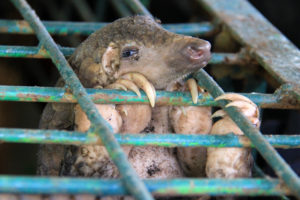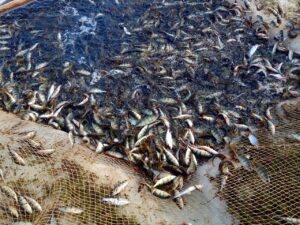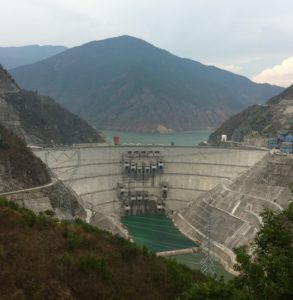
Wildlife crime is devastating biodiversity and driving species to extinction. Often run by transnational crime syndicates, this activity, includes the taking, trading, obtaining, and consumption of wildlife in contravention of national or international law. Accounting for $216 billion per year, the global trafficking of wildlife, fish, and timber is a security risk, threatening the economic and food security of people who depend on these animals and natural resources for their livelihoods. Such criminal activities undermine conservation efforts, rob countries of badly needed revenue and degrade the political stability of communities and countries across the world.
While wildlife crime has been a fixture for decades, in recent years the scale of this illicit activity has increased, outpacing efforts to monitor, regulate, and prosecute it. The networks involved with these criminal endeavors is also contributing to regional insecurity. Violent non-state armed groups, such as the Lord’s Resistance Army, have employed the illegal wildlife trade to finance their operations. Transnational networks which transport illegal wildlife across borders are also used to smuggle drugs, guns, and people. Moreover, wildlife crime deprives governments of between $7-12 billion in revenue, hindering economic development in source countries, as well as their ability to build capacity to combat this illicit activity.
Further, there are growing concerns related to the impact that wildlife trade – both legal and illegal – can have on the spread of disease and the resulting disruptions to society. For decades, scientists have studied the increasing risk that zoonotic diseases pose to global health, particularly in the context of humans expanding their footprint into natural habitats. Evidence suggests that the coronavirus may have jumped from a bat, which has led to renewed calls to further regulate the wildlife trade. The economic disruption caused by COVID-19 have heightened the concern over wildlife trade.
Calls to combat wildlife crime are increasing. The UN General Assembly adopted resolutions in 2015, 2017, and 2019 which highlighted the devasting impact of poaching and the illegal trade in wildlife. Moreover, both Sustainable Development Goal 14 “Life below Water,” and Goal 15 “Life on Land,” call for the protection of wildlife and the habitats they depend on, as well as addressing illegal wildlife trade and ending illegal, unreported, and unregulated fishing. Despite these global governance measures, powerful criminal enterprises seem undeterred as they continue to destroy biodiversity, and trade in illegal wildlife, showcasing that more still needs to be done to curtail their illicit activities.
Stronger international agreements are essential to combatting wildlife crime. They can level the playing field, provide consistent rules, and help national governments work together to tackle this transnational issue through monitoring, enforcement, and prosecution. The Convention on International Trade in Endangered Species of Wild Fauna and Flora (CITES) for example is the primary international agreement which regulates the trade in endangered wildlife. However, its narrow focus on a subset of endangered species, limits its ability to combat transnational organized crime or prevent the spread of disease, raising the idea to expand its remit. Another framework which has potential if expanded, is the UN Convention on Transnational Organized Crime (UNTOC), the main international instrument in the fight against transnational crime.
Strengthening International Frameworks to Combat Wildlife Crime
In response to these challenges Stimson has joined End Wildlife Crime, an initiative seeking to strengthen international frameworks. The objectives of the End Wildlife Crime initiative are twofold: add a fourth protocol on the illicit trafficking of wildlife to the UN Convention on Transnational Organised Crime (UNTOC) and amend existing provisions in CITES to include public and animal health into decision making. Stimson will contribute to this initiative by providing a non-partisan platform for stakeholders to engage and deliberate on how such changes could work in practice.
The proposed changes to CITES and the UNTOC are important ideas worth consideration in expanding the protection of wildlife species and combatting the illicit networks that profit from wildlife crime. These ambitious objectives will require concerted diplomatic efforts across national governments, international organizations, civil society, and the private sector. The history of both CITES and UNCTOC show that altering the structure of these agreements, whether through an addendum or amendment, will take time and require an intensive effort to gain crucial buy-in from stakeholders throughout the process.
This demands strong leadership, political will, and open dialogue through every stage from introduction to implementation. The need to protect biodiversity, tackle transnational wildlife crime, and reduce the risk of future zoonotic diseases is recognized across the world. However, there is disagreement about the degree to which these issues should be tied together, as well as which international frameworks are the most effective mechanism to meet these interlocking goals.
To this end, the Stimson Center will serve a convener, where diverse partners can come together to discuss entry points, opportunities, and challenges associated with altering CITES and UNTOC, and how these changes can be effectively implemented. Through this role, Stimson will contribute to an evidence-based discourse on how the objectives of the End Wildlife Crime initiative can foster change at the international level to reduce and eliminate wildlife crime.



